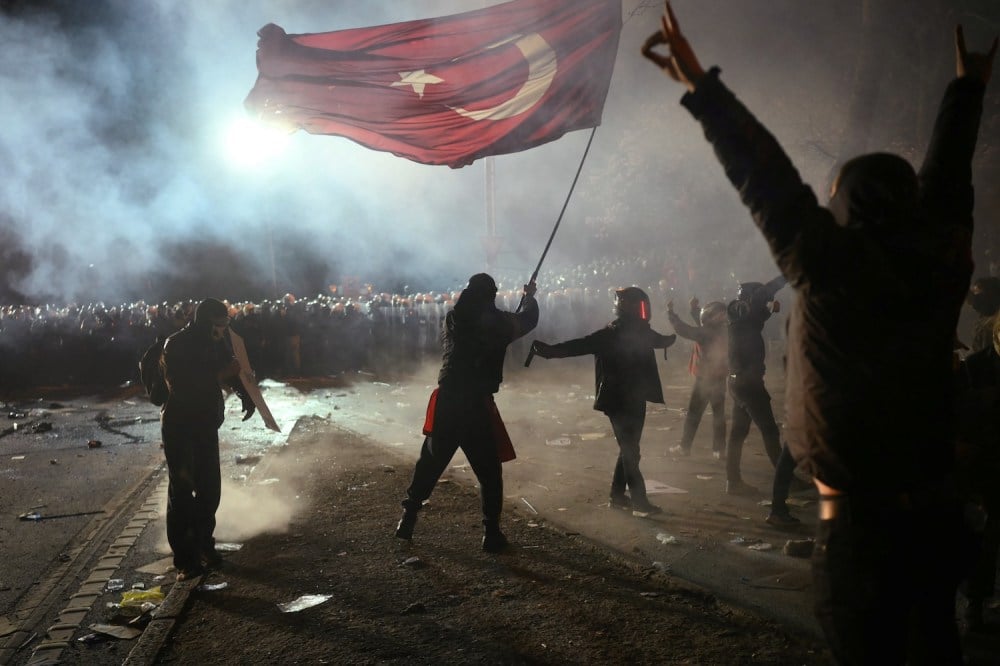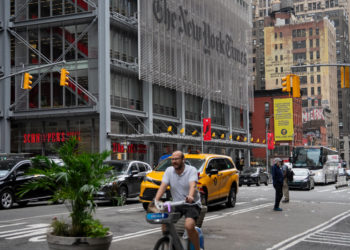Turkish President Recep Tayyip Erdogan’s decision last month to jail Istanbul Mayor Ekrem Imamoglu, his most formidable political rival, touched off the country’s fiercest political protests and boycotts in years. The move was made on charges of corruption and terror but has been characterized by observers and the Turkish opposition as a point of no return for Turkey’s democracy, marking a momentous step toward full-blown autocracy.
This attempt to disqualify Imamoglu from running in the next election significantly narrows the opposition’s path to electoral victory and shows that Erdogan will not allow any credible challenges to his rule. Combined with the erosion of judicial independence, media freedom, and fair election procedures, the ballot box no longer offers a credible path for political change. For many, the streets have become the last remaining arena of resistance.
But while Erdogan has taken significant steps toward consolidating authoritarian rule, Turkey does not have the economic and political structures necessary for full dictatorship. Most notably, Erdogan lacks a fully loyal coercive apparatus that can unconditionally enforce his will—particularly the military, long considered indispensable to robust autocratic regimes.
This places Turkey in a precarious limbo between competitive authoritarianism, where elections and other democratic institutions nominally exist but are undermined by systematic abuses of power, and outright dictatorship. In this transitory phase, the regime will be highly susceptible to public protest but still lack the coercive capacity needed to decisively crush it. The arrangement is inherently unstable and could backfire should Erdogan continue down this path.
Since the mid-2000s, Erdogan has tried to coup-proof the military by reshaping its leadership and purging suspected dissidents. This effort intensified following the violent coup attempt of 2016, which was primarily led by the followers of the late Muslim cleric Fethullah Gulen, who sought to oust Erdogan—and failed.
While Erdogan has succeeded in securing obedience at the top, the result is not a uniformly loyal force but a deeply politicized one at all levels. The difference matters: A loyal military is unconditionally obedient and ideologically aligned with the regime, while a politicized military is fractured, pressured by political expectations, and internally distrustful behind a compliant, unified facade.
By politicizing the military, Erdogan has also jeopardized the future of his own regime. If he continues to escalate repression—particularly if he attempts to deploy the military to suppress protests—he risks overplaying his hand. The military would want to remain neutral, but if pushed too hard to comply with the regime’s demands, it could splinter, with destabilizing consequences not only for Turkey but also for the entire region.
The anti-government protest movements that swept the Middle East in the 2010s as part of the Arab Spring offer sobering parallels. The fate of authoritarian regimes depended considerably on the military’s willingness to stifle dissent. In Tunisia and Egypt, the respective militaries’ refusal to forcefully suppress the protests was a key factor in allowing mass opposition to overthrow entrenched autocrats. In Bahrain and Saudi Arabia, loyal security forces helped monarchies survive by violently putting down demonstrations. And in Libya, Syria, and Yemen, fractured militaries’ divided loyalties between the regime and the opposition catalyzed bloody civil wars.
Turkey is not immune to these dynamics. Since 2016, Erdogan has overseen the purging of more than 125,000 public servants, including thousands of military officers. Pro-government media proudly emphasizes that the majority of those now serving in the judiciary and security services were hired post-coup through overt political vetting. It’s clear what message Erdogan’s regime is sending: The state will no longer tolerate dissent, and the security forces, including the military, will defend the regime.
But this narrative obscures a key reality: While Erdogan has packed state institutions with political loyalists, deeply institutionalized organizations such as the military are not so easily remade.
Militaries and other hierarchical institutes, which have their own cultural norms and organizational structures, tend to moderate political interference. This is particularly true in Turkey, where military socialization occurs early and is both intense and enduring.
Moreover, ideological loyalty cannot be engineered by stacking the ranks with political hires. As I’ve observed in my own research, many recruits come from apolitical backgrounds or engage in what might be called “lifestyle falsification”: adapting their appearance and behavior to meet political expectations without deep internalization of regime ideology. Signaling political loyalty and securing a political reference may help candidates gain entry or get promoted, but they do not guarantee long-term loyalty.
Military recruitment patterns are also shaped by informal social networks that link the armed forces to particular regions and social groups. Just as the U.S. military has roots in specific geographic, cultural, and family milieus, the Turkish officer corps draws from long-standing social channels that resist political homogenization.
When establishing a regime army, autocrats often prioritize building loyalty at the top, selectively promoting ideologically or ethnically aligned generals, as former Syrian President Bashar al-Assad or Venezuelan President Nicolás Maduro have done.
But even this strategy has its limits. Senior officers are drawn from limited-sized cohorts that are deeply socialized with institutional values. Even generals who rose under Erdogan’s watch, such as Tevfik Algan, have nonetheless demonstrated allegiance to the republic’s founding principles, just as conservative figures such as Hulusi Akar did when the military was staunchly secular.
More resistant still are the middle ranks, from captains to colonels, who command tactical units and interact daily with soldiers and civilians. Their embeddedness in professional military culture makes them indispensable but means that it’s difficult to monitor their political loyalties. Even the most sophisticated surveillance systems and networks often struggle to penetrate this layer of command.
Creating a truly obedient military takes time, and even then, defection remains a persistent risk. As the Arab Spring uprisings revealed, even in tightly controlled, long-standing regimes, soldiers may refuse to fire on civilians, as was the case in Tunisia, Egypt, and partly in Syria.
And Turkish officers, despite their historical role in coups, have generally resisted aiding personalist leaders, particularly in moments of mass protest.
The fragility of Erdogan’s control over the military was exposed in August 2024 at the graduation of the Turkish Military Academy.
After the official ceremony, which Erdogan attended, hundreds of newly commissioned lieutenants raised their swords and pledged allegiance not to the president but to the secular and democratic principles of the republic. Their chant, “We are Mustafa Kemal’s soldiers,” was a pointed invocation of Mustafa Kemal Ataturk, the founder of the Turkish republic, and his secular legacy.
Erdogan responded with purges—five lieutenants dismissed, three academy supervisors removed—that were barely approved by a divided army disciplinary board. Algan, the army chief of staff who voted against the dismissals, was soon forced to resign. The episode revealed a military leadership that is far from unified.
Electoral data further complicates Erdogan’s loyalty narrative. In the 2019 and 2024 local elections, despite a campaign steeped in nationalism and militarist symbolism, officers and their families overwhelmingly supported opposition candidates such as Imamoglu and Ankara Mayor Mansur Yavas. In Istanbul and Ankara, precincts near military housing recorded opposition support as high as 80 percent. Even in smaller garrisons, where conservative-leaning enlisted soldiers also went to the ballots, Erdogan’s Justice and Development Party underperformed.
These trends reflect more than political dissatisfaction. The officer corps is uninsulated from national grievances: Military families are subject to the same economic precarity—soaring inflation, housing shortages, and declining purchasing power—that fuels broader discontent.
Beyond cohesion, Erdogan’s politicization of the military is also corroding its effectiveness. This is an important concern for officers, who observe its consequences firsthand. While Turkish forces have conducted competent cross-border operations in Syria and Iraq, much of this success owes to battlefield experience and technological superiority, including drones—not institutional strength and efficiency.
The 2023 earthquake response laid bare the consequences of Erdogan’s coup-proofing efforts. The military failed to mobilize effectively during critical early hours, paralyzed by a chain of command wary of acting without political direction.
And last year’s graduation incident, leading to the discharge of highly decorated officers and the military academy’s five top-ranking graduates, deepened anxieties in the officer corps. Many officers increasingly fear that professional merit is being sacrificed on the altar of political conformity.
Erdogan’s Turkey has long been classified as a competitive authoritarian regime, where elections are real but unfair. The arrests of Imamoglu and the chairmen of the nationalist Zafer party and the pro-Kurdish Peoples’ Equality and Democracy Party, combined with the erosion of electoral integrity, have pushed the country into murkier territory. Elections now appear largely symbolic; even pro-government voices openly admit that power transfer through the ballot box is hardly feasible.
Yet without a uniformly loyal military, Turkey has not become a fully coercive autocracy, either. Turkey now exists in an uneasy midpoint—what might be called an “uncompetitive autocracy” or “semi-coercive dictatorship”—that presents a unique danger.
By politicizing the military and hollowing out the electoral process, Erdogan has sown the seeds of conflict and instability, undermining both regime durability and the prospect of a peaceful transfer of power. In the worst-case scenario, if protests swell and Erdogan clings to power at all costs, Turkey may veer toward the paths of Syria or Libya—protracted internal conflict and chaos—and not Egypt or Saudi Arabia.
Erdogan may yet seek to use the armed forces to silence dissent. But as both Turkey’s history and that of the broader region suggest, the more that autocrats lean on their militaries for repression, the more likely they are to lose control of them.
The post Erdogan Risks Overplaying His Hand appeared first on Foreign Policy.




